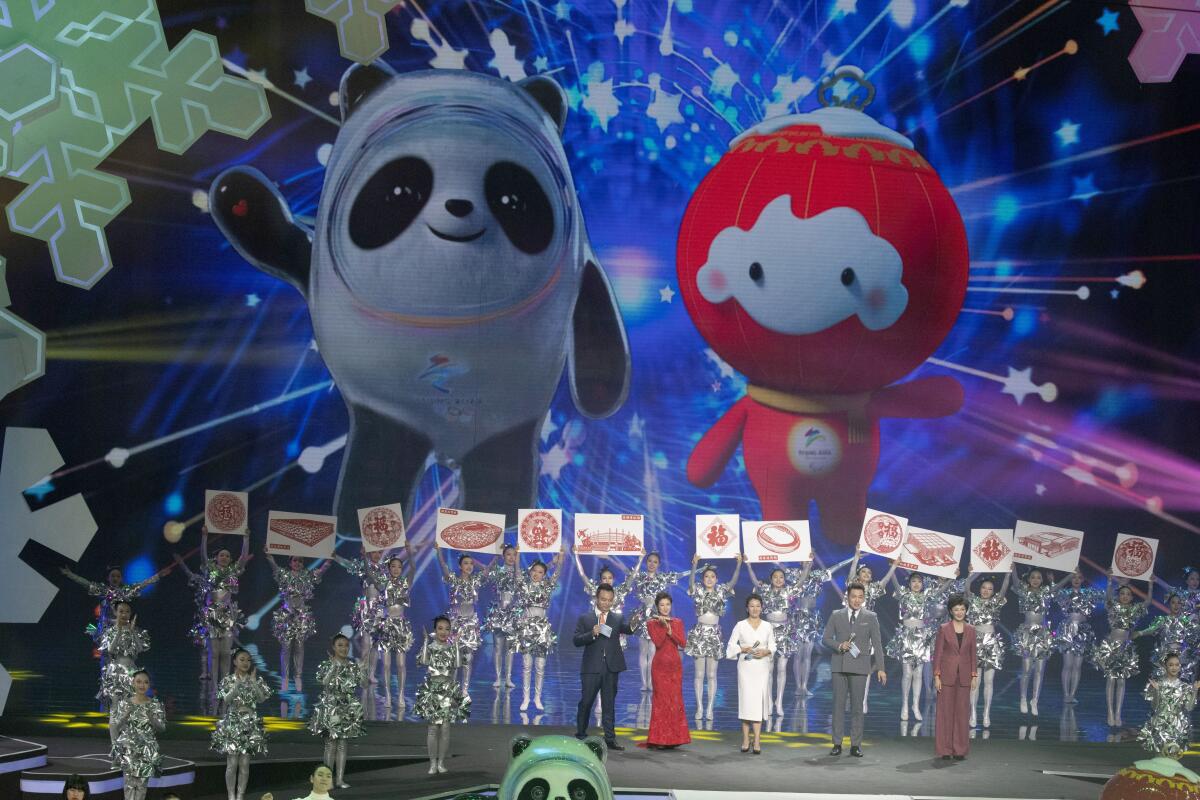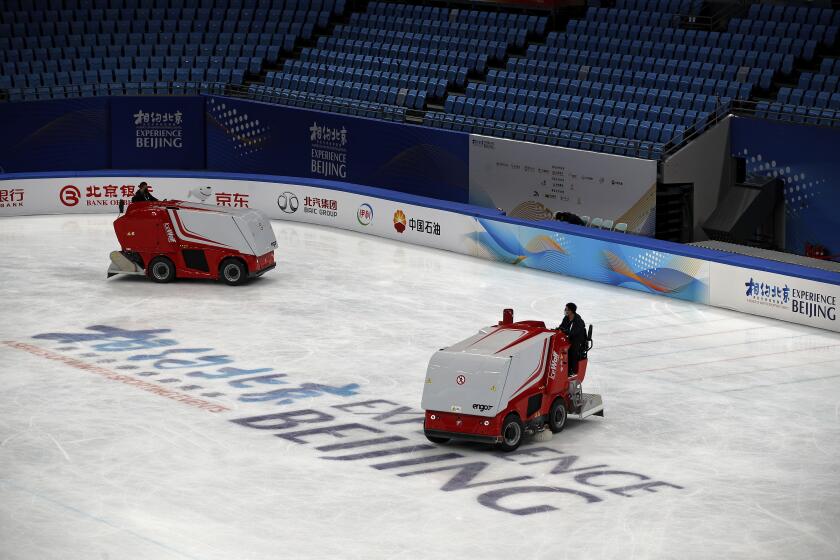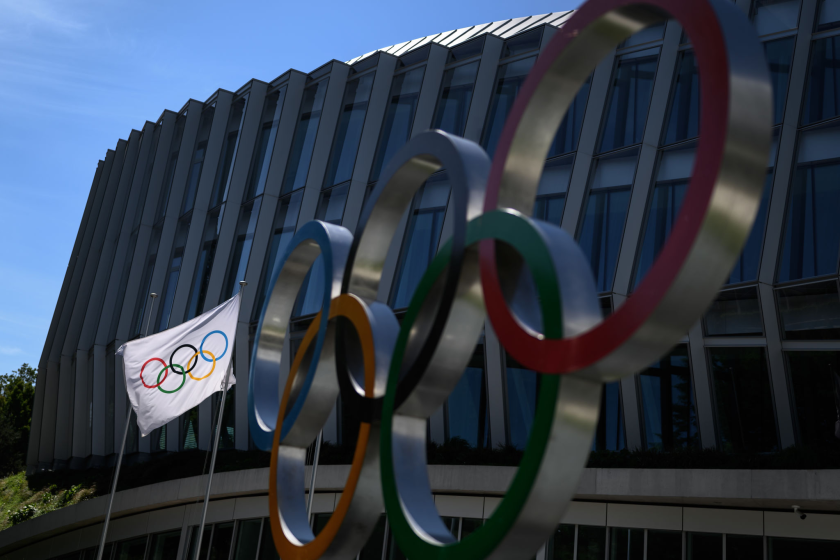Olympic leaders struggle to deal with China’s history of human rights abuses

- Share via
For months now, Olympic leaders have scrambled to keep a step ahead of trouble.
With the 2022 Winter Games in Beijing less than a year away, they have attempted to downplay talk about China’s history of human rights abuses. They have dismissed any mention of an international boycott.
“A boycott from the Olympic Games has never achieved anything,” Thomas Bach, president of the International Olympic Committee, said recently.
None of that prevented a suggestion from the State Department this week that the U.S. might consult with other countries about forming a coalition to skip the Games.
“It is something that we certainly wish to discuss,” spokesman Ned Price said in a briefing with reporters who asked about an Olympic boycott. “A coordinated approach [with other countries] would be not only in our interest but also in the interests of our allies and partners. So this is one of the issues that is on the agenda both now and going forward.”
The U.S. would consider a joint boycott with other countries of the 2022 Winter Olympics in China over human rights abuses, the State Department says.
Price later said he had been misinterpreted, tweeting: “As I said, we don’t have any announcement regarding the Beijing Olympics. 2022 remains a ways off, but we will continue to consult closely with allies and partners to define our common concerns and establish our shared approach to the [People’s Republic of China].”
Whatever the Biden administration’s intention, the issue is not likely to fade away. As the IOC struggles to stage the Tokyo Summer Games amid a lingering pandemic in July, it will continue to face questions about next winter.
“You have an obvious human rights abuser as the Olympic host,” said Jules Boykoff, a political science professor at Pacific University in Oregon who studies the Olympic movement. “China has also become a bipartisan punching bag.”
Both the Biden and Trump administrations have labeled China’s repression of the Muslim Uyghur minority as genocide. At recent bilateral talks in Alaska, Secretary of State Antony J. Blinken referred to Chinese cyberattacks on the U.S. and aggression against Taiwan as actions that “threaten the rules-based order that maintains global stability.”
There has also been widespread criticism of crackdowns on pro-democracy activists in Hong Kong.
It was obvious that IOC members were risking an international headache as far back as 2015, when they selected Beijing as host city. Not that they had much choice in the matter.
The recently completed 2014 Winter Olympics cost the Russians a reported $51 billion, a number that scared away bidders for ensuing Games. By the time the vote for 2022 came around, only two candidates remained.
Listed beside Beijing on the ballot was Almaty, Kazakhstan, a much smaller city in a country that was relatively new to the Olympic scene.
China’s standing in the international community did not matter. At least, not enough. Nor did the fact that the mountains northwest of Beijing received only eight inches of snowfall annually, meaning alpine venues would rely on manmade snow.
Always eager to market their brand, IOC members saw a chance to boost winter sports in a region where skiing and ice hockey were starting to gain traction among the burgeoning middle class.
In a vote marked by electronic glitches and a recasting of paper ballots, Beijing won by four votes.
“This is really a safe choice,” Bach said. “We know China will deliver on its promises.”
Russia can’t use its name, flag or anthem at the next two Olympics. The decision in the doping case has drawn mixed reactions around the world.
The selection sparked immediate outrage among activists and human rights groups who said China’s Communist Party was being rewarded amid its strongest crackdown on dissent in decades. Olympic historian John J. MacAloon called it “the biggest mistake the IOC could have made.”
Six years later, calls for a boycott have grown significantly louder as the Games draw nearer.
American skiing star Mikaela Shiffrin recently criticized the IOC’s choice, telling CNN: “I doubt it’s an easy job, but it feels like there could be more consideration when you’re hosting an event that’s supposed to bring the world together and create hope and peace in a sense.”
Much like the IOC, the U.S. Olympic & Paralympic Committee has been working to head off drastic action.
“We’ve already been in dialogue with a number of people in Congress as well as some of President Biden’s White House staff,” USOPC chairwoman Susanne Lyons said recently. “Our strategy at the moment is to insure there is dialogue.”
Mikaela Shiffrin became the first American to win six world championship skiing titles with her gold in the combined on Monday.
Speaking with reporters at a pre-Olympics summit on Wednesday, her tone was more urgent.
“The U.S. has many tools to constructively respond to these concerns,” Lyons said. “We do not believe that Team USA’s young athletes should be used as political pawns.”
Olympic history is no stranger to boycotts. Some nations skipped the 1956 Summer Games in response to the Soviet Union’s quelling of the Hungarian Revolution. In 1968, some threatened to withdraw over South Africa’s apartheid policies.
For Bach, an elite German fencer in his younger days, the subject is very personal.
His four-man foil team won a gold medal at the 1976 Summer Olympics but never got a chance to defend their title as Germany, the U.S. and other countries joined in a boycott of the 1980 Moscow Games to protest the Soviet Union’s invasion of Afghanistan.
Whenever the subject arises, the IOC president is quick to point out that Moscow led to a retaliatory boycott at the 1984 Los Angeles Games. And it wasn’t until 1989 that the Soviet army finally left Afghanistan.
“Why would you punish the athletes from your own country if you have a dispute with another country?” he asked. “This makes no real sense.”
Staff writer Tracy Wilkinson contributed to this report.
More to Read
Go beyond the scoreboard
Get the latest on L.A.'s teams in the daily Sports Report newsletter.
You may occasionally receive promotional content from the Los Angeles Times.










